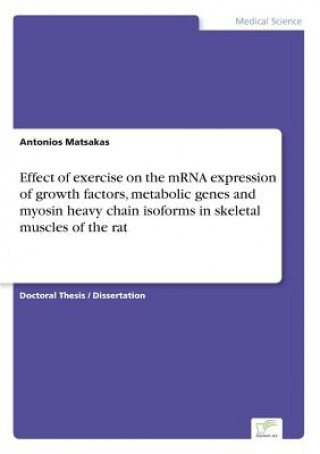
Dostawa
Doradca ds. zakupów
16 126 809 książek w 175 językach







Pokaż wszystkie języki (175)





Jednak się nie przyda? Nic nie szkodzi! U nas możesz zwrócić towar do 30 dni
 Bon prezentowy
O dowolnej wartości
Bon prezentowy
O dowolnej wartości
Bon prezentowy to zawsze dobry pomysł. Obdarowany może za bon prezentowy wybrać cokolwiek z naszej oferty.
Effect of exercise on the mRNA expression of growth factors, metabolic genes and myosin heavy chain isoforms in skeletal muscles of the rat
 Angielski
Angielski
 255 b
255 b
30 dni na zwrot towaru
Mogłoby Cię także zainteresować


Doctoral Thesis / Dissertation from the year 2004 in the subject Medicine - Human Genetics, grade: 1,0, Sport Academy Cologne (Medizin- und Naturwissenschaften, Kreislaufforschung und Sportmedizin), language: English, abstract: Inhaltsangabe:Abstract:§Skeletal muscle is a complex and heterogeneous tissue capable of remarkable adaptation in response to various stimuli such as exercise training. Molecular biology approaches have made a large contribution to our current understanding of how mechanical loading can alter gene expression and muscle protein synthesis rates in skeletal muscle. The steady-state level of a given mRNA is a function of both its rate of synthesis and its rate of degradation, implying that the rate of change in response to a cellular stimulus is dependent on the dynamics of mRNA turnover. Changes in muscle mRNA steady-state levels can be taken as an index of changes in gene expression, constituting currently one of the best described and understood molecular events that underlie muscle plasticity. §The discovery of new growth factors involved in the regulation of muscle development provides a better understanding of the molecular mechanisms involved in the adaptation of skeletal muscle to exercise training. Since it has been shown that changes in contractile function can be brought about by switching on one subset and repressing another subset of genes, it was hypothesized that the steady state level of multiple mRNAs (growth factors and metabolic genes) involved in regulatory functions in a muscle which is frequently recruited during exercise is different between endurance trained versus untrained rats. Recent scientific data indicate that myostatin constitutes a limiting factor in normal muscle development playing a crucial role in skeletal muscle hypertrophy. Nevertheless, there are only scarce data so far about the role of myostatin in the exercise-induced skeletal muscle adaptation. The transient changes in regulatory and structural gene expression provide the molecular basis of the adaptability of the skeletal muscle to exercise stimulus. §To get an insight into the molecular mechanisms of skeletal muscle adaptation, the main objective of this study was to examine the effect of both the short- and long- term effect of exercise (five day of swimming vs. chronic wheel running) on IGF-I and MSTN (positive and negative skeletal muscle regulators respectively) mRNA contents in male Wistar rats. Potential increase of positive and/or decrease of negative regulators of muscle growth lead to enhanced muscle-progenitor proliferation providing a new perspective in the mechanism of muscle adaptability. It was hypothesized that exercise training could be accompanied by an up-regulation of IGF-I and/or down-regulation of the MSTN gene (positive and negative skeletal muscle regulators respectively). Because MSTN expression has been reported to be more prominent in fast-twitch muscle, diverse skeletal muscles with different fiber type composition and recruitment patterns during movement were analyzed (gastrocnemius, vastus lateralis and soleus). In addition, MSTN was analyzed in combination with the mRNA contents of glucose transporter 4 (GLUT4), hexokinase II (HK II), and hydroxyacyl-CoA dehydrogenase (HAD), a set of well characterized metabolic genes. On the level of structural genes, myosin heavy chain (MHC) I, IIa and IIb mRNA were analyzed in gastrocnemius and vastus lateralis muscles of trained and untrained animals.§Rats were studied in two experiments by using two different protocols. Initially, the effect of 5-day endurance swim training on mRNA contents of MSTN and IGF-I (growth factors), HK II, GLUT4 and HAD (metabolic genes) and MHC isofors was analyzed in gastrocnemius, vastus lateralis and soleus muscles of male Wistar rats. In a second phase, the effect of a 12-week wheel running on the mRNA contents of the above mentioned genes was analyzed in a study...
Informacje o książce
 Angielski
Angielski




 Jak kupować
Jak kupować














